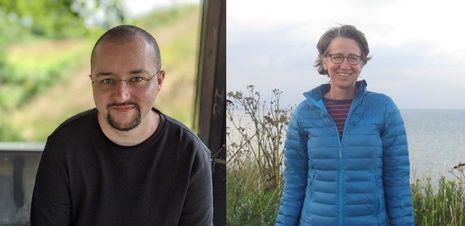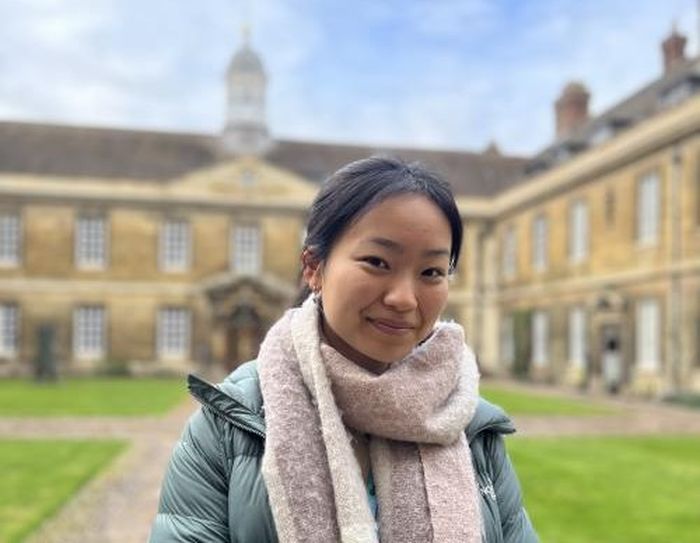The LGBT+ church members making Cambridge a more inclusive place to be Christian
Reverend Dr. Alex Clare-Jones and Alison Binney of Downing Place United Reformed Church speak to Varsity about inclusion, affirmation, and injustice

Downing Place United Reformed Church may only be a few years old, but its history of LGBT+ affirmation is by no means new.
Alison Binney’s journey began as a Cambridge student in the 90s. Though “theological divisions” regarding LGBT+ identities meant she didn’t have a church at the time, Alison found acceptance in her college chapel. It was there that Alison “came out as gay and felt secure in being both gay and Christian.” She returned to Cambridge in 2001, but again struggled to find an inclusive church. Some churches were “actively unwelcoming”, and more still were simply communities “where nobody said anything, so I couldn’t tell if it was going to be a safe space.” However, at Emmanuel United Reformed Church, Alison “immediately felt safe to be myself.”
Determined for Emmanuel URC to be a church where LGBT+ people felt confident they would be welcomed, Alison worked to gain Safer Spaces accreditation and advocated for the church to celebrate events such as LGBT+ History Month. When Emmanuel URC amalgamated with St. Columba’s to form Downing Place URC in 2018, Alison continued this work as a church elder and co-founder of Open Table Cambridge, a dedicated community for LGBT+ people and allies.
Rvd. Dr. Alex Clare-Young is a newer arrival, having first attended the church while completing ministry training at Westminster College. As a non-binary person, Alex had similar concerns about whether they would be welcomed at Westminster, especially as “no other trans people have been ordained in the URC yet.” However, during their training Alex met regularly with Downing Place Minister Nigel Uden, who reassured them that their identity was “going to be celebrated.”
Alex became Downing Place’s Pioneer Minister last April, a role which involves being a welcoming presence in the community in different ways, from connecting with people in pubs to liaising with campaign groups to see how the church can support their causes. They also launched Solidarity Hub at Downing Place, a group dedicated to establishing “radical solidarity” across Cambridge through community support and social action. For Alex, “the joy of being entirely myself and being in ministry” speaks to Downing Place’s “quite unique” wholehearted affirmation of the LGBT+ community.
“Activism involves repentance for the way churches have hurt people”
Alison and Alex’s past experiences have clearly shaped their dedication to being “loud” about Downing Place’s support of LGBT+ people. And loud they are — Downing Place regularly holds services and socials for LGBT+ people and allies through Open Table, as well as hosting annual LGBT+ History Month services. Alison emphasised the importance of beginning Open Table services with refreshments, a consideration made with the recognition that many attendees “haven’t entered a church in a long time, or the last time they did was really difficult.” Alex also explained the importance of undertaking trauma awareness training to better recognise “how complex it is for folks who have had bad experiences in church,” especially those who have experienced spiritual abuse or discrimination. They always aim to “be sensitive to how we’re responding to that, both in services and afterwards, because a lot of that trauma comes out.”
Downing Place recognises that, to positively change the church and wider society, they must acknowledge previous harms. As Alex admits, activism involves “a repentance for the way churches have hurt people.” Alex’s protesting centres upon “speaking out for justice in a way that shows love without being overly divisive,” although they acknowledge that occupying that position can mean that “neither churches nor protest spaces are entirely comfortable with you.”
Alison and Alex identified this dual-alienation as a struggle for LGBT+ Christians, with their position in both communities occasionally feeling in conflict with their identities as a whole. While the difficulties of existing as LGBT+ in Christian spaces are widely known, being Christian in LGBT+ spaces can often feel similarly exclusionary. As Alison shared that she “sometimes found it harder to come out as a Christian than [...] as gay”, I asked how LGBT+ people such as myself can better support Christians in our community. Alex would “challenge people to come along” to a Downing Place service, to aid in deconstructing inbuilt assumptions regarding Christians. Alison agrees — “the only way to understand the variety of churches is to experience an inclusive church.”
As our conversation ended, I asked Alison and Alex what they would say to LGBT+ Christians who feel excluded from spiritual life. Alex replied immediately: “the bottom line would be that you are loved, and you’re enough just as you are [...] faith can be lived out in a way that’s incredibly progressive and active.” Alison’s words were equally powerful: “I think sometimes people who feel unloved and frightened come from churches which say things like, “We take the Bible seriously” as a way to justify exclusion. And perhaps it would be helpful for you to hear this: We take the Bible incredibly seriously too.”
 News / Reform candidate retracts claim of being Cambridge alum 26 January 2026
News / Reform candidate retracts claim of being Cambridge alum 26 January 2026 News / Report suggests Cambridge the hardest place to get a first in the country23 January 2026
News / Report suggests Cambridge the hardest place to get a first in the country23 January 2026 Interviews / Lord Leggatt on becoming a Supreme Court Justice21 January 2026
Interviews / Lord Leggatt on becoming a Supreme Court Justice21 January 2026 Comment / How Cambridge Made Me Lose My Faith26 January 2026
Comment / How Cambridge Made Me Lose My Faith26 January 2026 News / Cambridge psychologist to co-lead study on the impact of social media on adolescent mental health26 January 2026
News / Cambridge psychologist to co-lead study on the impact of social media on adolescent mental health26 January 2026









